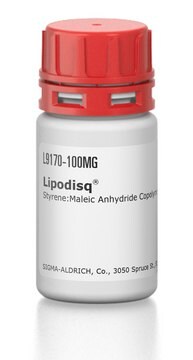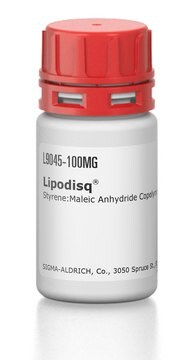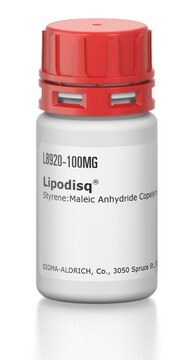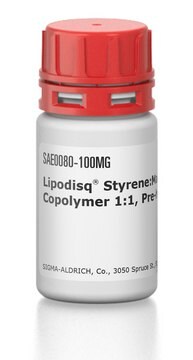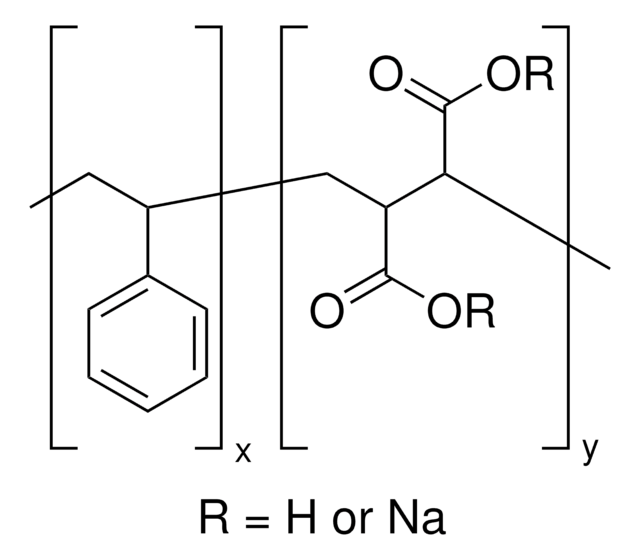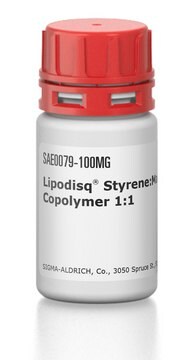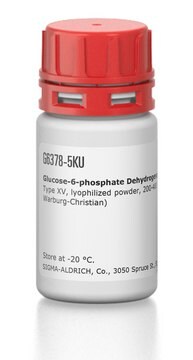Wszystkie zdjęcia(2)
Kluczowe dokumenty
SAE0062
Lipodisq®
Styrene:Maleic Anhydride Copolymer 2:1, Pre-hydrolyzed
Synonim(y):
Lipodisq Reagent, Lipodisq Solution
Zaloguj sięWyświetlanie cen organizacyjnych i kontraktowych
About This Item
Kod UNSPSC:
12352200
NACRES:
NA.25
Polecane produkty
Poziom jakości
temp. przechowywania
room temp
Opis ogólny
Lipodisq nanoparticles are usually made up of styrene maleic acid (SMA) copolymer and phospholipids. It has almost similar structure to that of nanodiscs. Lipodisq nanoparticles are considered as a good membrane mimetic system for the structural studies of membrane proteins.
Zastosowanie
Lipodisq reagents are novel polymers derived from styrene and maleic acid. Lipodisq polymers are capable of forming nanosized lipid-based discoidal particles capable of incorporating membrane proteins. The Lipodisq technology can solubilize commonly used lipids such as dimyristoylphosphatidylcholine (DMPC) without the use of detergents. Lipodisqs typically have a diameter of 9-10 nm at pH 7.4.
The Lipodisq technology can solubilize commonly used lipids such as dimyristoylphosphatidylcholine (DMPC) without the use of detergents.
Functional pH range: 5.5 - 8.0
The Lipodisq technology can solubilize commonly used lipids such as dimyristoylphosphatidylcholine (DMPC) without the use of detergents.
Functional pH range: 5.5 - 8.0
Działania biochem./fizjol.
Lipodisq nanoparticles are considered as a good membrane mimetic system for the structural studies of membrane proteins.
Opakowanie
100, 500 mg in poly bottle
Informacje prawne
Lipodisq is a registered trademark of Malvern Cosmeceutics Limited
Ta strona może zawierać tekst przetłumaczony maszynowo.
Kod klasy składowania
11 - Combustible Solids
Klasa zagrożenia wodnego (WGK)
WGK 3
Temperatura zapłonu (°F)
Not applicable
Temperatura zapłonu (°C)
Not applicable
Certyfikaty analizy (CoA)
Poszukaj Certyfikaty analizy (CoA), wpisując numer partii/serii produktów. Numery serii i partii można znaleźć na etykiecie produktu po słowach „seria” lub „partia”.
Masz już ten produkt?
Dokumenty związane z niedawno zakupionymi produktami zostały zamieszczone w Bibliotece dokumentów.
Characterization of the structure of lipodisq nanoparticles in the presence of KCNE1 by dynamic light scattering and transmission electron microscopy
Zhang R, et al.
Chemistry and Physics of Lipids, 203, 19-23 (2017)
Characterization of KCNE1 inside lipodisq nanoparticles for EPR spectroscopic studies of membrane proteins
Sahu I D, et al.
The Journal of Physical Chemistry B, 121(21), 5312-5321 (2017)
Juan Francisco Bada Juarez et al.
Biochimica et biophysica acta. Biomembranes, 1862(3), 183152-183152 (2019-12-18)
Dopamine receptors (DRs) are class A G-Protein Coupled Receptors (GPCRs) prevalent in the central nervous system (CNS). These receptors mediate physiological functions ranging from voluntary movement and reward recognition to hormonal regulation and hypertension. Drugs targeting dopaminergic neurotransmission have been
Juan Francisco Bada Juarez et al.
Chemistry and physics of lipids, 221, 167-175 (2019-04-04)
Nanoparticles assembled with poly(styrene-maleic acid) copolymers, identified in the literature as Lipodisq, SMALPs or Native Nanodisc, are routinely used as membrane mimetics to stabilise protein structures in their native conformation. To date, transmembrane proteins of varying complexity (up to 8
Nasz zespół naukowców ma doświadczenie we wszystkich obszarach badań, w tym w naukach przyrodniczych, materiałoznawstwie, syntezie chemicznej, chromatografii, analityce i wielu innych dziedzinach.
Skontaktuj się z zespołem ds. pomocy technicznej